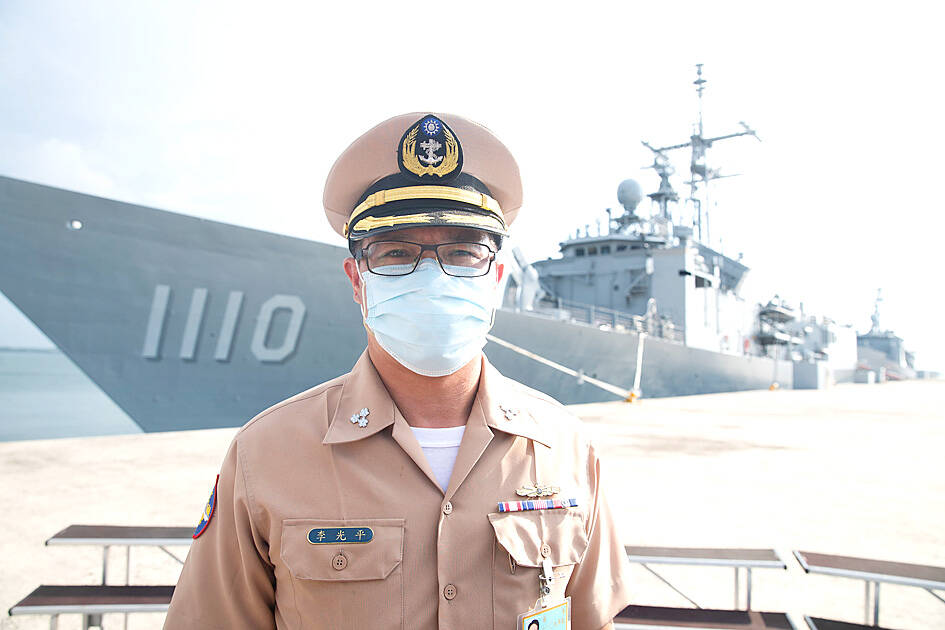The Zhenhai Project (震海計畫) — originally designed to produce a next-generation missile frigate — is to be downgraded to a 2,000-tonne placeholder frigate, while the Ministry of National Defense continues its research and development of a next-generation 6,500-tonne mainline battleship, the ministry said yesterday.
The ministry is to allocate NT$5 million (US$163,768) from its budget for next year to commission an assessment of the resistance, seaworthiness and ability to suppress the hydrodynamic noise of a sonar dome for the three types of keels of its planned 6,500-tonne destroyer, its budget report shows.
Given that the navy’s aging fleet of destroyers and frigates are 24 years or older, replacement ships are a priority, the ministry said, adding that the Zhenhai project, with a budget of NT$24.5 billion from 2019 to 2026, has seen multiple delays.

Photo: CNA
The project has been downgraded to introduce light frigates that would “plug the hole” for the navy and prevent a gap in its fleet of ships in service, the ministry said.
Previous funding for the project will go toward the construction of two ships that are expected to be completed before 2026, the ministry said.
The project shift would swiftly introduce vessels that could assist the navy’s Tuojiang-class corvettes in providing a counterweight to Chinese military ships, which have been harassing Taiwanese vessels, it said.
However, the move does not mean the navy is abandoning the research and development of a next-generation mainline battleship, it said.
Aside from the planned assessment, the ministry in 2019 commissioned the Ship and Ocean Industries Research and Development Center to test and analyze a new ship model, and in 2020, it conducted an analysis of sonar systems on the bow of a monohull frame, and analyzed how smoothly a 2,5000-tonne wave-piercing monohull would traverse underwater.
The ministry remained tight-lipped about information on the planned mainline battleship, saying only that it would announce relevant test results in time.
The ministry’s budget report for next year also shows that the navy plans to send three representatives to the nine-day Taiwan-US Affiliate Agreement for Preliminary Exchanges on Surface Ship Designs project.
This would give the representatives the opportunity to see the latest weaponry and cutting-edge technology developed by other countries, allowing the navy to expand its roster of potential countries from which it could source equipment, as well as solicit foreign support and collaborations on ship design, the budget report says.

The Ministry of Foreign Affairs (MOFA) yesterday voiced dissatisfaction with the Comprehensive and Progressive Agreement for Trans- Pacific Partnership (CPTPP), whose latest meeting, concluded earlier the same day, appeared not to address the country’s application. In a statement, MOFA said the CPTPP commission had "once again failed to fairly process Taiwan’s application," attributing the inaction to the bloc’s "succumbing to political pressure," without elaborating. Taiwan submitted its CPTPP application under the name "Separate Customs Territory of Taiwan, Penghu, Kinmen and Matsu" on Sept. 22, 2021 -- less than a week after China

THE GOOD WORD: More than 100 colleges on both sides of the Pacific will work together to bring students to Taiwan so they can learn Mandarin where it is spoken A total of 102 universities from Taiwan and the US are collaborating in a push to promote Taiwan as the first-choice place to learn Mandarin, with seven Mandarin learning centers stood up in the US to train and support teachers, the Foundation for International Cooperation in Higher Education of Taiwan (FICHET) said. At the annual convention of the American Council on the Teaching of Foreign Languages held over the weekend in New Orleans, Louisiana, a Taiwan Pavilion was jointly run by 17 representative teams from the FICHET, the Overseas Community Affairs Council, the Steering Committee for the Test of Proficiency-Huayu, the

A home-style restaurant opened by a Taiwanese woman in Quezon City in Metro Manila has been featured in the first-ever Michelin Guide honoring exceptional restaurants in the Philippines. The restaurant, Fong Wei Wu (豐味屋), was one of 74 eateries to receive a “Michelin Selected” honor in the guide, while one restaurant received two Michelin stars, eight received one star and 25 were awarded a “Bib Gourmand.” The guide, which was limited to restaurants in Metro Manila and Cebu, was published on Oct. 30. In an interview, Feng Wei Wu’s owner and chef, Linda, said that as a restaurateur in her 60s, receiving an

Kaohsiung Mayor Chen Chi-mai (陳其邁) on Monday announced light shows and themed traffic lights to welcome fans of South Korean pop group Twice to the port city. The group is to play Kaohsiung on Saturday as part of its “This Is For” world tour. It would be the group’s first performance in Taiwan since its debut 10 years ago. The all-female group consists of five South Koreans, three Japanese and Tainan’s Chou Tzu-yu (周子瑜), the first Taiwan-born and raised member of a South Korean girl group. To promote the group’s arrival, the city has been holding a series of events, including a pop-up